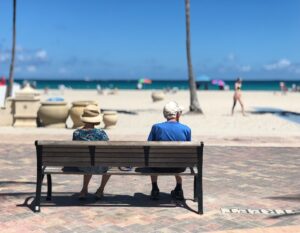To retire in Mauritius, choose between the 10-year Retirement Visa (Retired Permit) or the 1-year Premium Visa. Alternatively, you can retire in Mauritius by buying a property of over USD 200,000 in a PDS scheme. The requirements to retire in Mauritius are: be at least 50 years and have a minimum monthly income of USD 1,500. Alternatively, you can show a minimum of USD 18,000 in a bank account of your country of residence or origin. Retiring in Mauritius on the Premium Visa requires you to show a monthly amount of at least USD 1,500, return flight tickets, proof of accommodation and travel and health insurance.
Here, at TBI Mauritius, we have over 13 years of experience in relocation services, helping foreigners move to and retire in Mauritius. We understand the intricacies of moving to a new country as a foreign retiree. We offer full relocation support including guidance regarding health insurance and housing options that cater for senior living. Whether you are looking to retire in Mauritius from South Africa, US or UK, the conditions and procedures are the same. To know more about moving to Mauritius from South Africa, read here.
Why You Should Retire In Mauritius
The benefits of retiring in Mauritius include, retirement-focused facilities such as, access to medical facilities on-site, assisted living. Retirees can invest in Smart Cities and luxurious developments which include, restaurants, cafes and spas, conveniently located nearby. When it comes to location, most foreigners live in the North and the West. The West has limited facilities in comparison to the North and it is a far easier commute to the Centre from the North where the biggest hospitals are.
Medical facilities in Mauritius have been improving over the years. With 5 public hospitals and more than 30 private clinics across Mauritius, this island provides premium services and quality healthcare. Foreigners do not tend to use local hospitals and we recommend that you look at private facilities always. As retirees, you can also easily avail to private health insurance facilities. With a focus on retirement facilities, retiring in Mauritius as a foreigner has become easier in the last few years.
MAURITIUS RETIREMENT VISA
To get a Mauritius retirement visa valid for 10 years, you must be at least 50 years old and:
- Show USD 18,000 in a bank account, or
- Have a guaranteed minimum income of USD 1,500 per month.
 Right to Invest
Right to Invest
Holders of the Retirement Visa are allowed to invest in any business in Mauritius, provided that they are not employed in the business or deriving any salary or employment benefits from it. Retired foreigners can also buy property in Mauritius for over USD 200,000. They can buy property under the Property Development Scheme, which has projects that specifically cater for senior living. This will automatically give them permanent residency as long as they own the property.
Right to Work
Holders of the Retirement Visa are allowed to work remotely from Mauritius. However, they are not allowed to work for any company in Mauritius, unless they have an occupation permit. The good news is that it is easy to switch permits from a retirement permit to an occupation permit that enables you to work.
Become a Permanent Resident by retiring in Mauritius
An advantage of the Mauritius retirement visa is that you get permanent residency in Mauritius, if you transfer at least $54,000 during the 3 years preceding the application. This would be an option if you want to extend your stay for another 20 years. Having a Permanent Residence Permit in Mauritius will allow you to stay in Mauritius for 20 years. However, you still have the option to renew your retired permit for another 10 years on the island.
Mauritius Premium Visa
If you are looking to retire in Mauritius and aren’t sure whether it’s the right place for you, you can apply for a Mauritius Premium Visa. This longer term travel visa will allow you to move to Mauritius for 1 year (renewable) and test the waters here. To retire in Mauritius on the Premium Visa:
- You must be from an eligible country. There are over a hundred listed on the EDB website.
- Show proof of accommodation and travel and health insurance for the period of stay.
- Do not enter the Mauritius Labour market. The main place of business and source of income and profits should not be in Mauritius.
- Show proof of funds (at least USD 1,500 monthly)
Frequently Asked Questions
How do I get a retirement visa for Mauritius?
To get a retirement visa for Mauritius, you must be at least 50 years old and have a minimum monthly income of $1,500. Alternatively, you can also show a minimum amount of $18,000 in your bank account.
How much do I need to retire in Mauritius?
To retire in Mauritius, you would need around $2,500-$3,000 per month on basic expenses such as housing, food, and transportation. The cost of living in Mauritius varies depending on your lifestyle and spending habits. If you want to live a more luxurious lifestyle, you will need to budget accordingly.
Is there a long term visa for Mauritius?
The Mauritius Premium Visa is a long term visa in Mauritius that allows a foreigner to retire in Mauritius and live on the island for up to a year. To qualify for this visa as a retired, you must have a minimum monthly income of $1500.
Where is the best place to retire in Mauritius?
One of the best places to retire in Mauritius is the North of Mauritius, specifically around Grand Baie, due to it being more developed, with a vibrant nightlife and modern amenities. The West of Mauritius is also where a lot of expats decide to retire as it is quieter and more focused on outdoor activities and nature. Read more on how the North compares with the West here.
Can retirees buy property in Mauritius?
As per the latest 2023-2024 budget, foreign retirees aged at least 50 years, can buy property in Mauritius, if the property is worth more than USD 200,000. The property should be part of the Property Development Scheme, designed for senior living. Buying a property as a retiree will grant the foreigner a residence permit. This form of property investment is a pathway to living in Mauritius permanently as long as the property is owned. Also, any foreigner who buys a property of at least USD 375,000 in an approved scheme will be granted permanent residence in Mauritius.
Can a US citizen retire in Mauritius?
US citizens can retire in Mauritius by applying for the Mauritius Retirement Visa, the Premium Visa or by buying a property valued at more than USD 200,000.
How can I get permanent residency in Mauritius?
Foreigners can get permanent residency in Mauritius through one of the following options:
- Buy a property of at least $375,000 in an approved scheme
- Invest $375,000 in a qualifying business activity
- Be an occupation permit holder
- Retire in Mauritius on a retirement permit
What TBI Business Advisors can do for you:
- Provide expert advice on the Mauritius Retirement Visa. We can explain the requirements for a Retirement Visa and help you determine if you are eligible.
- Assist you with the Retirement Visa application process. We will help you gather all of the required documents and complete your application correctly. We will also represent you in front of the government officials during the application process.
- Provide ongoing support after you receive your Retirement Visa. We can help you relocate to Mauritius and settle into your new home. We can also provide you with advice on Mauritius tax law, business regulations, and other important matters.
